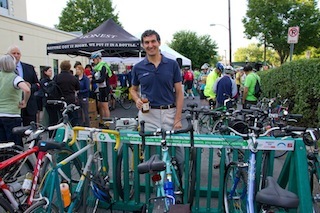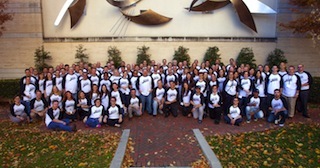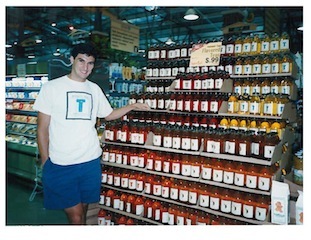You've surely heard of the internationally-known brand, HONEST Tea, but what about the story behind this startup? Seth Goldman shares the tips he has gathered from founding one of the most lucrative social enterprises of our time.
Seth Goldman's HONEST Tea is one of the most successful companies around today. They championed a business model that incorporates both social good and corporate consciousness -- making them part of a revolution that is changing the way we think about and do business. And Seth is an exemplar from this new generation of CEOs.
Seth standing next to a bike rack made recycled materials including Honest Kids pouches at National Bike to Work Day in 2012
Second and third bottom lines, corporate social responsibility (CSR), mission-driven business -- these keywords don't just signify environmentally-friendly coffee cups, Saturday employee volunteer events, and partnerships with national nonprofits like NFTE. They represent a fundamental shift in the corporate sector -- where both businesses and their customers have begun to realize that active consideration for human capital and the environment leads to better living and more sustainable business. Just look at the facts:
- 87 percent of consumers consider the social and environmental impacts before they buy
- 92 percent of entry-level hires and students desire an environmentally-friendly company
We see it everywhere, from the customers' willingness to pay a premium for fairly-harvested, environmentally-friendly products, to businesses increasing profitability and long term sustainability by incorporating social and environmental impact into their missions.
Over 80 percent of employees experience an increased motivation and loyalty due to their employer's positive CSR reputation.
Our priorities are changing. Seth's alma mater, Yale School of Management, among many others, has seen heightened demand for, and access to, social impact courses and majors--over a 100 percent increase since 2003. A recent survey found that almost half of a consumer's opinion about a company is based on its corporate social responsibility impact. Both research and popular opinion are beginning to demonstrate the long term and increased sustainability of business with a conscience.
If you had told me 16 years ago that I would be building an organization that is 1) helping to eliminate billions of calories from the American diet; 2) supporting more sustainable organic agriculture; and 3) promoting Fair Trade labor standards in the developing world, I would have asked which non-profit or government entity I was working with. Instead, to my surprise and delight, I have found a way to achieve these goals through a for-profit company.
In November, Seth, as a former winner of the EY Entrepreneur of the Year award, gave the keynote address at their conference in Palm Springs. I caught up with Seth after, and he told me about founding HONEST Tea with his former Yale professor Barry Nalebuff, an expert in competitive strategy. He described leading the beverage-tea industry, partnering with over 100,000 stores nationwide, and eventually being acquired by Coca-Cola. He taught me that success in social business requires humility to wear every kind of hat on the job, persistence to get up when you fail, and open-mindedness to do something so forward-thinking.
The staff of Honest Tea taken at the 2013 annual company meeting in Bethesda, MD.
Seth's advice for young people looking to get started in the business:
1. First, read our book, Mission in a Bottle, The Honest Guide to Doing Business Differently and Succeeding. We include all the lessons from our experience, many of which were quite painful. It's the book we wish we could have read before we launched Honest Tea. We hope our readers can avoid the same mistakes! (see also)2. Then, I encourage people to gain experience selling something--you need to gain experience persuading people, whether it's buying a product, an investment or a job. Then, finally, I always encourage students to write a business plan--make sure you can feel comfortable thinking through and discussing every aspect of a business.
Steve Mariotti: You spoke before about finding your competitive advantage, and how intimidating that process can be. Were you ever scared?
Seth Goldman: [In the early days], fear was our most plentiful resource! I had no knowledge of the beverage industry or business. Distribution is so critical, and having no knowledge of that and no connection, no understanding of how to have the conversation--I was certainly on a much steeper learning curve.
Seth harvesting tulsi at a tulsi garden in Bangaluru, India, in 2012
That being said, we were very far ahead of our time. Had we had those connections and knowledge, we would have launched our product before consumers were ready for it. Instead, we were stuck in the Natural Foods market for a long time. This was fortunate because its where our core consumers were, where our best relationships were--and as a result we continue to benefit from a strong core channel. When many beverage makers would come in and offer super-sweet drinks, we would use a teaspoon or two of honey or organic sugar, etc. We really had a point of difference.
SM: What inspires you about the evolution of your company?
SG: Over the years I have been able to visit tea suppliers in India, China, Sri Lanka and South Africa. It is invigorating to see how our purchases and the Fair Trade premiums that we invest in these communities help support an approach to nature and to labor that is on the leading edge of sustainability and economic empowerment. We play a profound role in elevating the working conditions and supporting the fragile ecosystems upon which our tea gardens rely, and it's energizing to see our brand's growth translate into greater capacity from our suppliers.
Tea garden in Korakundah, India
SM: What is particularly challenging about your work?
SG: There's no question it is more challenging to build an organic, Fair Trade brand, not to mention one that has a lot less sugar than the competition. Organic and Fairtrade ingredients cost more--that's just a fact. And then we know that sweeter drinks sell better--the human body has evolved to crave calories--that's how our ancestors survived. So marketing against pocket books and evolution is no easy task. But we also know that in the long-term, if we want to build a brand that will endure, we have to develop something meaningfully different from our competition.
SM: How did HONEST Tea get the money to start up?
SG: Within a month of starting the company, my co-founder Barry and I received an opening order for the 17 local Whole Foods stores. We needed funds to pay for that first production run, so we raised money from the only people we knew who couldn't say no: first, we each personally invested money in the company. Then our parents and my sister put money in. The next wave of investment came from Barry's friends from college. Those combined investments came out to about $500,000.
We structured those investments as equity. Each person's ownership percentage was proportionate to what was invested. So someone who invested $100,000 owned 20 percent of the company. We also included founders' warrants so that as the value of the stock grew, Barry and I would have the option to gain more equity. Now Honest Tea has delivered 26 times in ROI.
In 1998, product displays like this one were uncommon
SM: What were the early days of starting up like? How did you do it?
SG: We had a business plan and I personally met with every potential investor. It was a face-to-face process. During our first two years, I spent more time selling stock than I did selling tea. I don't have any regrets about that because it was pivotal for our growth. As an entrepreneur, you can't take your eye off the ball. We had some good sales people doing their job. However, it is also the CEO's job to be the lead salesperson.
Special thanks to Lauren Bailey and Maya Horgan for assistance on this article.





